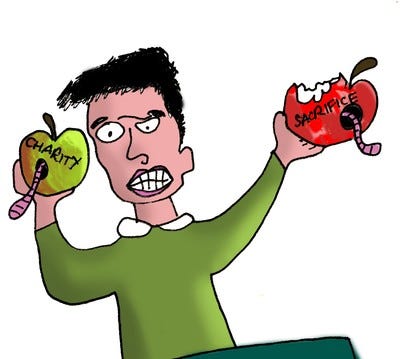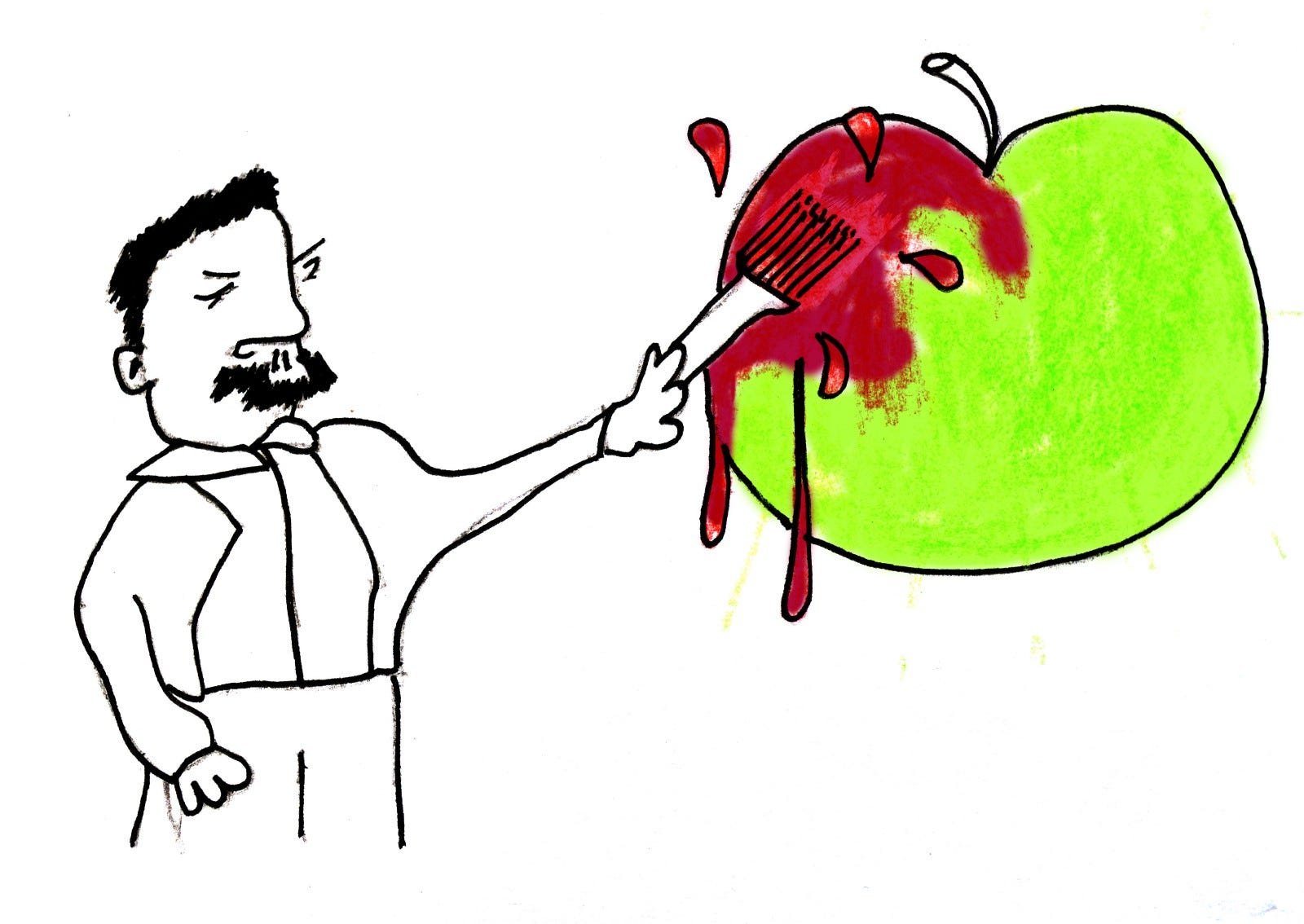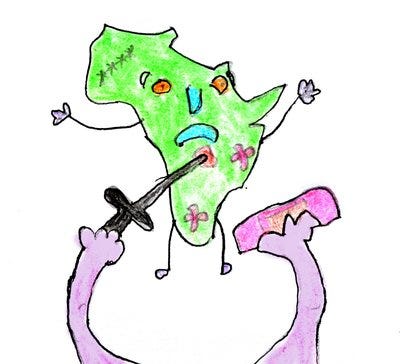Most people want to help those suffering across the planet. Most people would welcome a more harmonious, loving existence for all. Wouldn’t you? But our society and culture gives us a very limited set of options for making a difference in the world.
As far as I can see we’re presented with just two substantial options about how we can help: Sacrifice or Charity. Both have big flaws.

Our rotten options
The first option is individual sacrifice. It always involves giving something up or punishing ourselves in some way. We’re told that we should make sure to recycle. We should only buy fair trade, organic products. We should try to save energy by turning off lights and having shorter showers.
While these sacrifices are important, our consumer society is giving us the only type of option it knows: an individualistic consumption one. Maybe we need to move beyond a paradigm that says the only impact we can have on the world is through our consumption choices.
But this article isn’t about the problems with the sacrifice option, although undoubtedly there are many. If you’re interested a great place to start is this short YouTube video called forget shorter showers.
This article is about the second option that society presents us with: the charity option. We’re told that we can continue our lives as normal, guilt-free, as long as we regularly donate to charity. We’re shown pictures of starving children, war zones and devastated ecosystems which are carefully designed to cultivate an almost painful level of empathy. We’re then told that the only way we can feel better about ourselves and the world is to reach into our pockets and fork over some of our hard earned cash.
But my main issue with this option isn’t the methods used to get you to donate but instead where the money ends up going.
Fundamentally most of this money ends up funding what I call patching solutions.
This is where, instead of addressing the root causes of issues, we just patch a plaster on top hoping to make things temporarily better.
Take poverty in Africa as an example. Charities often take an overly simplistic view of the problem. They see poverty and underdevelopment as attributes of Africa itself. Sort of like an apple being red. They fail to see that there is a global economic system behind poverty that perpetuates and deepens the problems on the African continent. In the analogy of the apple we could say it was actually a green Granny Smith! But the world system was painting it red. Most charities fail to acknowledge this.

Granny Smith being painted red
The REALLY ironic (and upsetting) thing is that when you take a deeper look into the complex system behind poverty, many of the forces that work to perpetuate it come from the West. The buck stops with us!
A great example of this is resource extraction. We’ve been told all our lives that the African continent is poor, but in terms of resource wealth, many African countries are some of the richest on the planet. A third of the earth’s mineral deposits lie beneath its soil.
In The Looting Machine Tom Burgis explains how large parts of Africa can be simultaneously resource rich and economically poor.¹ His conclusion: we live in a world of financial colonialism where Western (and increasingly Chinese) governments and multinationals plunder the continent for its resource wealth, often leaving the countries themselves little if anything to show from the interaction. Instead they are often left with toxic, self-serving regimes, kept in power largely by the cash from resource wealth. The people of Africa don’t benefit much from their huge natural wealth, but their dictators and elites most certainly do. It’s mostly Western companies and governments doing this plundering, so it is our responsibility to fix this situation.
To sum up this charity option, I have a metaphor. It’s like the West is trying to ignore the fact that in our left hand we have a knife that’s repeatedly stabbing the third world (resource plundering etc), while at the same time time we’re using our right hand to put patches on the wound. Then we’re back to the stabbing. Sounds like madness, right?

Africa being simultaneously stabbed and patched
The even CRAZIER thing is that our patches aren’t EVEN that good. I wrote my dissertation on the effectiveness of aid to Africa. Tonnes of research led me to the conclusion that although sometimes we do manage to patch the issues (that we mostly created in the first place), often we actually make the problems worse. A good example of this is how the aid we give to foreign governments often increases corruption. And this corruption often solidifies authoritarian regimes that do a lot of damage to their citizens.
Isn’t it obvious that instead of trying to patch up the third world we should simply stop stabbing it?
I want to propose a third option for helping the world, the systemic option, that does exactly that. Instead of patching the issues of the world it could actually work towards addressing their underlying causes.
So in the case of Africa, instead of trying to patch poverty, this systemic option would work to combat its underlying causes. What are these underlying causes? Well let’s trace them right back to their roots baby!
So you’ve got poverty in Africa caused primarily by Western ‘stabbing’. In the case of Resource Plundering, what’s behind that? Well we use the plundered resources to continue our rampantly consumerist Western lifestyles. Why do we have these Western consumerist values in the first place? Well, because they’ve been thrust down our throats for decades: first by the advertising of companies who want to make as much profit as possible, and second by governments who rely on economic growth to stay in power.
I’m going to make one final step in this causal chain and ask: how were these values propagated by advertising and governments able to really pervade our culture? Fundamentally, I think it’s because large portions of the population were never exposed to any alternatives to a consumerist life. We are all in a struggle to find something inherently meaningful in our lives and advertising is here saying: “Look, buying things is meaningful! It’s an easy path to happiness!”. And we lap it up because there’s nothing else on the menu.

Tracing poverty back to its roots
I’ve simplified things a bit here because these causes don’t actually follow in a linear chain like this. There is no root cause of poverty. In fact, each cause is constantly cross-pollinating all the others. It’s not a linear chain but a giant web of networked causation.

Actually it’s a complex network of interacting causes
But Julyan, you might say, changing any of these systemic issues in a world as complex and multi-dimensional as ours is close to impossible. Our only choice is to put on the patches of the charity option. For a while, I too held this view. But I think it over-simplifies the issues at hand. It views systemic change as an all-or-nothing affair. It says either we live in a capitalistic, hierarchical world dominated by self-interest where problems like poverty exist, or we make the seemingly impossible switch to a better system overnight. Even though we don’t yet know what that system would look like.
But in fact, when we think about our existence on planet earth as a networked system, we realise there are tonnes of things we can do that would ameliorate the systemic problems of the planet. A networked system means everything is intimately connected and interdependent which means if we can make a change to one part of the network it has effects on the whole.
Taking the poverty example, here are a few ideas for how we could use this systems option to improve things:
- We could lobby our governments to remove advertising from our cities (achieved by Sao Paulo, proposed in Berlin).
- We could use art, events, and festivals to help people realise that there are other possibilities for meaning in life than consuming things.
- We could start companies or social enterprises that don’t exploit the third world and maybe even try and help it!
- We could bring our community together to become energy and resource self-dependent. The list goes on.
You might say these are all pretty high, mighty and difficult to achieve goals. But we can make small steps towards them. Simply helping just one person overcome the pressures of the current system and live a life based on systemic purpose instead of self-interest would have knock-on effects throughout the network. Instead of ending up in a job that perpetuates the systemic issues, e.g. most banking/ finance jobs, maybe they start an organisation to teach people about the problems of consumerism and the wonderful simplicity of a more minimal life. This would then have even more knock-on effects as people benefit, take on non-materialist values, and then spread them to others. In this way we can create feedback loops of positive change that spread through global networks.
Through these feedback loops, we can create multiple global chain reactions that filter through society to slowly unearth and tackle the root issues of our time.
We’ve created this publication, Exponential Altruism, to start exploring what this systemic option would look like and how to bring it into the world.
So I’ll leave you with one final question: how can you put the systemic option into practice in your own life? Where you try to engage with the problems of the planet, not just by patching but by working to tackle the underlying issues of our time.
References
1. Tom Burgis (2015): The Looting Machine: Warlords, Tycoons, Smugglers and the Systematic Theft of Africa’s Wealth, HarperCollins Publishers.